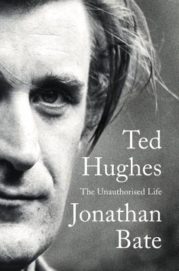
Jonathan Bate
Harper ($40)
by Katie Marquette
Ted Hughes is arguably one of the most hated men in literary history. Following the death of his first wife, Sylvia Plath, and the subsequent success of her dark and disturbing Ariel poems, Hughes was accused of everything from wife beating to sadism to outright murder. Feminists proudly adopted the deceased Plath as one of their own, a female artist brought to the point of despair by an egotistical man, or so the story went. Her grave was repeatedly vandalized: “Sylvia Plath Hughes” was changed back to simply “Sylvia Plath,” with crude marks etched over the surname “Hughes.” The message was clear: in the grand drama of history, Sylvia Plath was to be remembered. Ted Hughes was to be erased.
Jonathon Bate’s new biography, Ted Hughes: The Unauthorised Life, challenges this traditional narrative. The book’s release in the fall of 2015 might have marked the first time a significant biography has been solely devoted to Hughes; previous biographies have generally been dual-biographies of Plath, with one biography even titled Her Husband. Whatever else, this is truly the story of Hughes, not Plath.
Writing in elegant and lucid prose, Bate gives readers a glimpse into the life of a brilliantly complicated man. We follow Hughes through his raucous youth, hunting and fishing with his brother and father. His childhood on the English moors instilled in him a deep love and respect for nature, a passion that led him to become an environmental activist in his later years. He was a smart but distracted student, preferring to work on his own projects. He had a natural talent for writing and poetry, and although he considered a career as a zoologist, it seemed he was always destined for the literary life.
He met Sylvia Plath when she attended Cambridge on a Fulbright Scholarship. Their connection was immediate and they were married only four months after they met. Their notoriously passionate and troubled marriage occupies only a brief section of the biography, but Bate is sure to emphasize the importance of this time, as Hughes’ years with Plath were an incredibly formative time for him as a poet. It was Plath, after all, who typed up and sent away the manuscript of The Hawk in the Rain, his first poetry collection, which would win him the Galbraith prize and a much-needed $5,000.
Hughes loved and was loved by women all his life. His hulking frame, deep voice, and passionate nature endeared him to countless women, only a handful of which we get to meet in Bate’s biography. Despite his notoriety, Hughes was an intensely private man and many of the details of his relationships are left to conjecture. What can be said with certainty is that Hughes was infatuated with women, even viewing them in mythical terms. He was obsessed with Robert Graves’s The White Goddess and saw women as powerful, but often destructive, characters in the drama of his life.
Hughes’ life was filled with tragedy: the death of Plath, the death of his lover Assia Wevill and their young daughter Shura, the death of a longtime friend and lover of early onset cancer—the list goes on. One can only be grateful he didn’t live to see his son, Nick, commit suicide. Bate explains the complex way in which Hughes dealt with these tragedies. Famously, Hughes placed immense importance on his dreams, often viewing them as prophetic. He also cast divinations, asked for people’s star signs, and used a Ouija board. A deeply spiritual man, he saw meaning in everything, perhaps especially in death. He also saw his role as poet in mythical terms. When made Poet Laureate of England, he saw himself as noble seer, diviner of truth. In his mind he was performing a sacred duty.
While the personal details of Hughes’ life are undeniably engrossing, Bate also gives equal attention to his poetry. While Hughes’ poetry is infamously repetitive and abstruse, it is also expertly crafted, filled with complex allusions and metaphors. With his thorough knowledge of Hughes’ life, Bate seamlessly weaves poetry in and out of the narrative. With so much interest in Hughes’ personal life, his art is often left out completely. Bate takes pains to give equal attention to portraying both Hughes the man and Hughes the artist, an awareness any serious student of poetry will appreciate.
The thesis of the biography, if there can be a thesis to a man’s life, is that Hughes’ tragic marriage to Plath completely dominated his life. Although Bate has done an admirable job in keeping this biography focused on Hughes, not Plath, ultimately it seems he cannot escape her. Hughes, a man obsessed with myth and meaning, saw Plath as a shade from the underworld, a wraith come to haunt and inspire him. Although previous biographies have often painted Hughes as the adulterous womanizer, Bate gives us a softer, but no less accurate, perspective. This book is especially important for the many Plath disciples who still dismiss Hughes’ literary contributions based on somewhat simplistic assumptions about his and Plath’s marriage.
"I hope one has the right to one's own life," Hughes said, while in the midst of legal disputes over rights to Sylvia Plath's work. This tension between being a public figure (Poet Laureate, "myth-maker," "prophet," etc.) and a highly private person dominated Hughes' life. Clearly this contradiction would plague his biographer as well; Bate devotes a lengthy section at the end of the book to justifying the existence of this “unauthorised life”—a type of biography, Bate insists, Hughes would have preferred. The role of biography is complex, but for what it's worth, Bate can rest easy knowing he has written a candid, thorough, and respectful account of such a monumental figure. Thanks to Bate, Ted Hughes cannot be erased after all.
